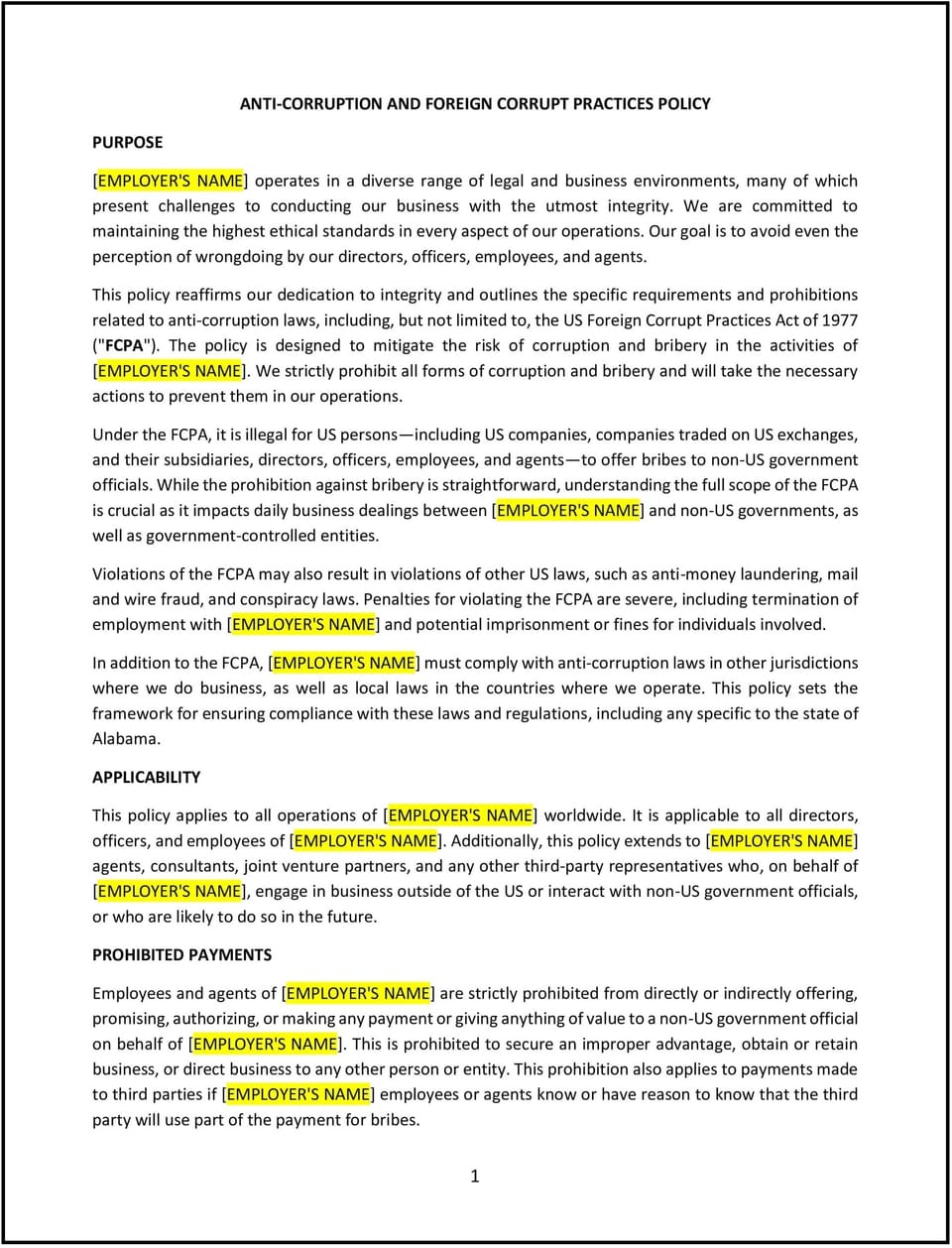Anti-corruption and foreign corrupt practices policy (Alabama): Free template

Anti-corruption and foreign corrupt practices policy (Alabama)
An anti-corruption and foreign corrupt practices policy is a critical document designed to help businesses prevent bribery, corruption, and other unethical practices. In Alabama, this policy provides clear guidelines to ensure compliance with federal regulations such as the Foreign Corrupt Practices Act (FCPA) and any applicable state-specific laws. Tailoring this policy to your business safeguards your reputation, mitigates legal risks, and promotes a culture of integrity.
How to use this anti-corruption and foreign corrupt practices policy (Alabama)
- Understand its purpose: Highlight the importance of maintaining ethical standards and compliance with the FCPA and Alabama’s business laws.
- Define key responsibilities: Clearly outline the roles of employees, management, and third-party partners in adhering to anti-corruption practices.
- Customize for your organization: Adapt the sections to address specific risks relevant to your industry and operational environment in Alabama.
- Communicate effectively: Share the policy with all employees and partners, emphasizing its importance through training and regular communication.
- Monitor compliance: Implement regular audits and reporting mechanisms to ensure adherence to the policy and detect any potential violations.
Benefits of using an anti-corruption and foreign corrupt practices policy (Alabama)
A well-implemented anti-corruption policy protects your business and fosters trust. Here's how it helps:
- Prevents legal risks: Ensures compliance with federal laws like the FCPA and Alabama-specific anti-bribery regulations.
- Enhances reputation: Demonstrates a commitment to ethical business practices, strengthening stakeholder confidence.
- Minimizes financial exposure: Reduces the risk of fines, penalties, and losses arising from corruption cases.
- Clarifies expectations: Provides employees and third parties with clear guidelines on acceptable conduct.
- Encourages reporting: Establishes channels for employees to report concerns without fear of retaliation.
Tips for using an anti-corruption and foreign corrupt practices policy (Alabama)
- Identify high-risk areas: Assess your operations in Alabama and internationally to address vulnerabilities in your policy.
- Train employees: Provide regular training on anti-corruption laws and the practical application of the policy.
- Establish reporting mechanisms: Create a confidential system for employees to report concerns about corruption or unethical behavior.
- Regularly review and update: Ensure the policy reflects changes in Alabama laws, industry regulations, or company practices.
- Communicate consequences: Clearly outline disciplinary actions for violations to underscore the seriousness of the policy.
Q: What is an anti-corruption and foreign corrupt practices policy?
A: A policy designed to prevent bribery and corruption while ensuring compliance with laws like the FCPA and Alabama-specific regulations.
Q: Does my business need this policy in Alabama?
A: Yes, any business operating in Alabama or engaging in foreign transactions should implement this policy to ensure compliance and maintain ethical standards.
Q: How often should this policy be updated?
A: Review it annually or whenever there are changes to the FCPA, Alabama laws, or your business operations.
Q: How can employees report corruption concerns?
A: Use a confidential reporting mechanism, such as a hotline or dedicated email, to encourage employees to report issues.
Q: Are third-party vendors included in this policy?
A: Yes, ensure that vendors and partners are aware of and comply with your anti-corruption practices.
This article contains general legal information and does not contain legal advice. Cobrief is not a law firm or a substitute for an attorney or law firm. The law is complex and changes often. For legal advice, please ask a lawyer.


